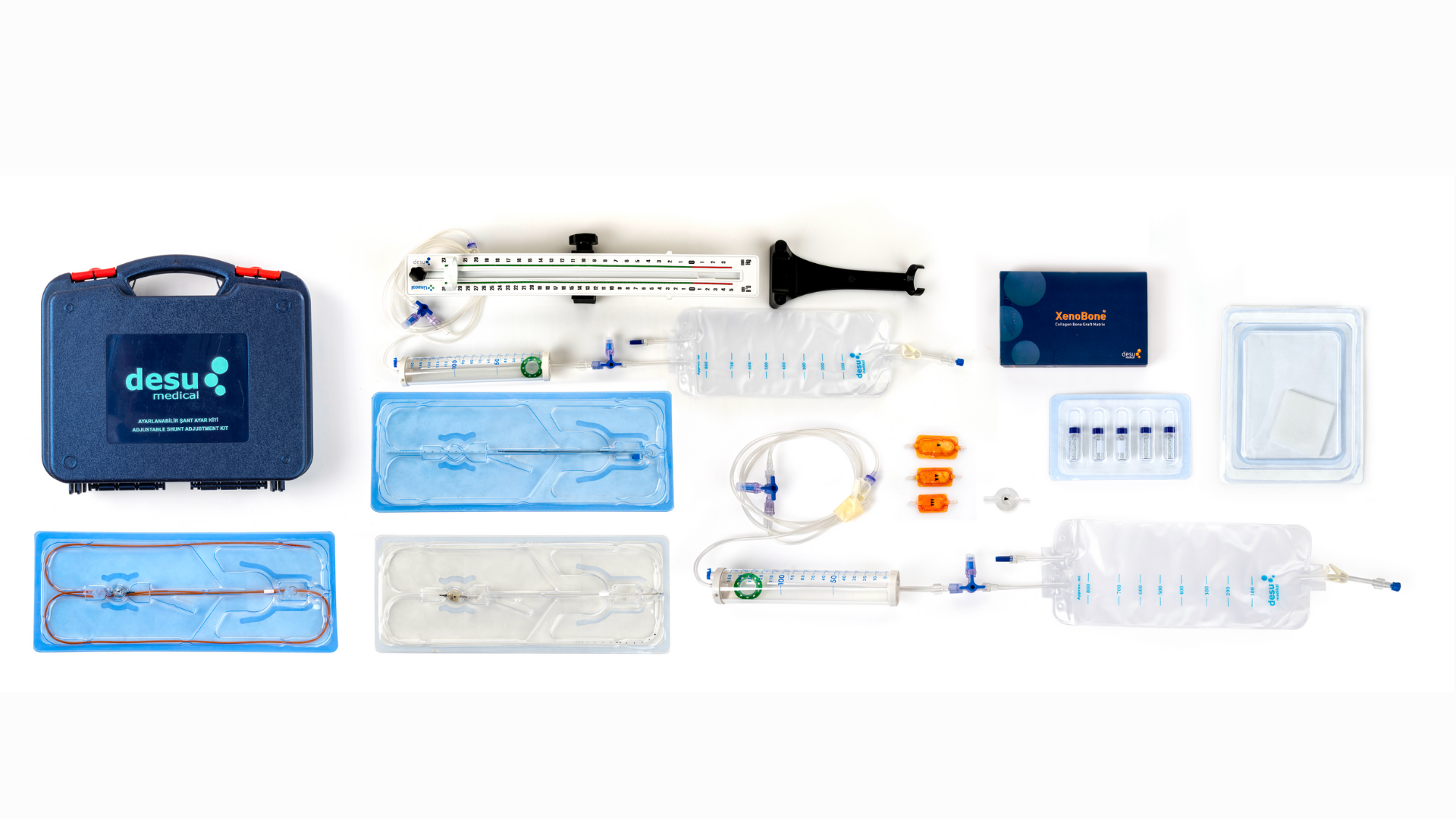Polysulphone Shunt Kits
Hydrocephalus is a neurological condition that results from the excessive accumulation of cerebrospinal fluid (CSF) in the ventricles of the brain, leading to increased intracranial pressure (ICP). This condition can cause severe neurological damage if not effectively managed. DESU Medical’s Polysulfone Hydrocephalus Shunt Kits represent an advanced solution in the treatment of hydrocephalus. Engineered with precision and designed to regulate intracranial pressure through controlled drainage of CSF, these shunt systems offer unparalleled efficiency, safety, and innovation.
Innovative Polysulfone Shunt System
The Polysulfone Hydrocephalus Shunt System is specifically designed to achieve precise regulation of intracranial pressure by ensuring the controlled drainage of excess CSF. This system helps maintain an optimal pressure balance within the cranial cavity, reducing the risk of complications associated with overdrainage or underdrainage.
DESU Medical’s Polysulfone Shunt System is available in two distinct configurations to address various clinical scenarios:
- Ventriculoperitoneal (VP) Shunt: Designed to divert CSF from the brain’s ventricles to the peritoneal cavity, where it can be reabsorbed by the body. This is the most common configuration for managing hydrocephalus.
- Lumboperitoneal (LP) Shunt: Ideal for conditions where CSF needs to be drained from the lumbar spinal region to the peritoneal cavity, such as cases of communicating hydrocephalus or idiopathic intracranial hypertension.
Advanced Material: Polysulfone
Polysulfone is a high-performance polymer known for its exceptional properties, making it an ideal choice for medical applications:
- Biocompatibility: Polysulfone’s inert nature ensures that it does not provoke adverse immune reactions, making it safe for long-term implantation.
- Durability: The material exhibits excellent resistance to mechanical stress, ensuring the structural integrity of the shunt system over extended periods.
- Thermal Stability: Polysulfone can withstand high temperatures, allowing for sterilization processes that maintain the highest standards of hygiene and safety.
- Chemical Resistance: The polymer resists degradation from body fluids and other substances, ensuring consistent performance over the life of the implant.
These properties make polysulfone shunt systems particularly reliable for managing hydrocephalus, even in challenging clinical environments.
Unique Design: Smallest Diameters for Superior Performance
One of the standout features of DESU Medical’s Polysulfone Shunt System is its compact design. The shunt body is engineered with the smallest diameters compared to other products available in the market, offering several critical advantages:
- Minimized Invasiveness: The smaller size reduces the invasiveness of the implantation procedure, leading to less trauma for the patient and faster recovery times.
- Enhanced Patient Comfort: The compact design ensures minimal impact on surrounding tissues, improving overall comfort and reducing the risk of complications.
- Greater Surgical Precision: The smaller dimensions provide surgeons with greater flexibility and precision during implantation, particularly in anatomically challenging cases.
Membrane Valve Mechanism for Precise Pressure Regulation
The Polysulfone Shunt System incorporates a sophisticated membrane valve mechanism designed to regulate CSF drainage with unparalleled precision. This mechanism offers:
- Accurate Pressure Control: The valve allows CSF to flow only when intracranial pressure exceeds a specific threshold, ensuring optimal pressure levels are maintained.
- Anti-Obstruction Design: The valve is engineered to reduce the risk of blockages, a common issue in traditional shunt systems, ensuring uninterrupted functionality.
- Consistency Across Use Cases: The valve provides reliable performance in both ventriculoperitoneal and lumboperitoneal configurations.
Versatile Applications
The Polysulfone Hydrocephalus Shunt System is designed to address a wide range of clinical scenarios:
- Congenital Hydrocephalus: Providing long-term management for infants and children born with hydrocephalus, ensuring proper neurological development.
- Acquired Hydrocephalus: Effective in managing cases arising from trauma, infections, tumors, or intracranial hemorrhages.
- Normal Pressure Hydrocephalus (NPH): Ideal for elderly patients suffering from NPH, where symptoms include gait disturbances, dementia, and urinary incontinence.
- Idiopathic Intracranial Hypertension (IIH): Suitable for patients requiring CSF diversion from the lumbar spine to alleviate increased intracranial pressure.
Key Features and Benefits
1. High-Performance Polysulfone Material
Polysulfone ensures long-lasting performance, biocompatibility, and resistance to environmental and chemical stressors. Its robust properties contribute to the reliability and durability of the shunt system.
2. Compact Design for Enhanced Patient Outcomes
The smallest shunt diameters in the market significantly improve patient outcomes by minimizing invasiveness, reducing recovery times, and enhancing comfort.
3. Precision Engineering
The membrane valve mechanism ensures consistent and accurate control of CSF flow, reducing the risk of complications associated with underdrainage or overdrainage.
4. Versatile Configurations
Available in both ventriculoperitoneal and lumboperitoneal options, the system provides flexibility to meet diverse patient needs and clinical scenarios.
5. Enhanced Surgical Efficiency
The compact design and precise engineering make the shunt system easier to implant, improving surgical efficiency and reducing operative time.
Clinical and Economic Advantages
The innovative design and superior performance of DESU Medical’s Polysulfone Hydrocephalus Shunt Kits deliver significant clinical and economic benefits:
- Improved Patient Outcomes: Patients experience fewer complications, faster recovery times, and a higher quality of life due to the system’s reliability and compact design.
- Cost Savings: Reduced complication rates and fewer revision surgeries translate to lower overall healthcare costs.
Surgeon Confidence: The precise and reliable performance of the system enables surgeons to deliver optimal care with greater confidence.

